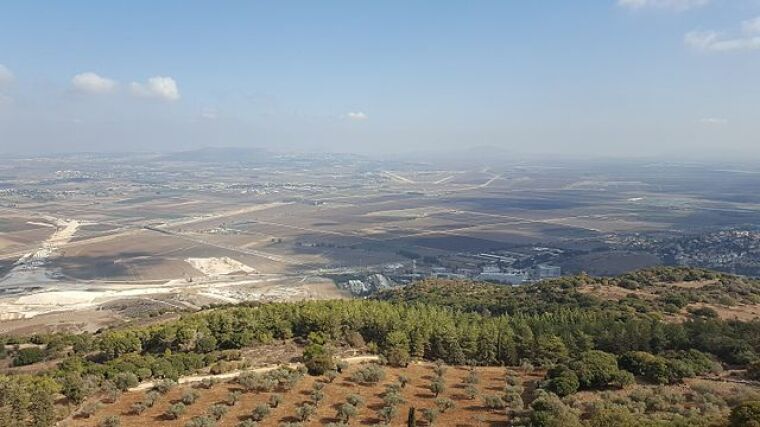Archaeologist finds traces of Biblical vineyard of Naboth in Jezreel Valley

An archaeologist working in Jezreel Valley in Israel has discovered some clues that could suggest that the story of Naboth's vineyard in the Old Testament was a factual account.
The veracity of the Biblical story of Naboth's vineyard has been opened up to speculation after Dr. Norma Franklin, one of the heads of the Jezreel Expedition, reported on some of the remarkable discoveries made in Jezreel Valley.
According to Breaking Israel News, Franklin had established that the valley was a major wine producing area in Biblical times.
Using laser technology, several features of the valley that had remained hidden for centuries were uncovered. Archaeologists found several wine and olive presses, including the largest ancient wine press in Israel found to date. The survey also uncovered more than 100 bottle-shaped pits carved into bedrock, which Franklin believes were used to store wine.
In light of the latest findings, Franklin is convinced that the Biblical story of the conflict between Naboth and King Ahab over a vineyard could very well have taken place.
"As an archaeologist, I cannot say that there was definitely a specific man named Naboth who had a particular vineyard," Franklin said.
"The story is very old but from what I have found, I can say that the story as described in the Bible quite probably could have occurred here in the Jezreel," she continued.
Based on the structure of the press, Franklin believes that the site was established before 300 B.C., a time frame that would allow for Naboth to be producing wine at that site.
The story of the feud between Naboth and King Ahab is recorded in the 21st chapter of the Book of Kings. The Bible narrates that Ahab coveted Naboth's vineyard that is located on the eastern slope of the hill of Jezreel near the king's palace. But Naboth did not want to sell the plot, and Torah law also forbade him from selling it outright because it was an inheritance.
A mock trial was staged by Queen Jezebel against Naboth in order to seize his property, prompting the prophet Elijah to confront Ahab, who later repented.
Franklin, who is not religious in her personal life, says she sees the relevance of the Bible in her research in Israel. However, she disputes some aspects of the Biblical narrative and suggested that Naboth did not actually live in Jezreel.
"Owning a vineyard would make him wealthy since wine was an important commodity. I reckon that since he was from the aristocracy he probably lived in Samaria and had more than one vineyard. This would give a slightly different picture than the Bible, which implies, though does not state explicitly, that he was a poor man being abused by the wealthy king," she said.
She also suggested that the Biblical account could have made Jezebel appear worse than she actually was, as some Biblical scholars believe that the story was written after the return to Babylon, which coincides with Nehemiah telling Israel to turn away their foreign wives.
"In some sense, she was a good wife, helping her husband who was sulking and depressed," she remarked.
 Christians don't have to affirm transgenderism, but they can’t express that view at work: tribunal
Christians don't have to affirm transgenderism, but they can’t express that view at work: tribunal Archaeology discovery: Medieval Christian prayer beads found on Holy Island
Archaeology discovery: Medieval Christian prayer beads found on Holy Island Presbyterian Church in America votes to leave National Association of Evangelicals
Presbyterian Church in America votes to leave National Association of Evangelicals Over 50 killed in 'vile and satanic' attack at Nigerian church on Pentecost Sunday
Over 50 killed in 'vile and satanic' attack at Nigerian church on Pentecost Sunday Ukrainian Orthodox Church severs ties with Moscow over Patriarch Kirill's support for Putin's war
Ukrainian Orthodox Church severs ties with Moscow over Patriarch Kirill's support for Putin's war Islamic State kills 20 Nigerian Christians as revenge for US airstrike
Islamic State kills 20 Nigerian Christians as revenge for US airstrike Man who served 33 years in prison for murder leads inmates to Christ
Man who served 33 years in prison for murder leads inmates to Christ


 Nigerian student beaten to death, body burned over ‘blasphemous’ WhatsApp message
Nigerian student beaten to death, body burned over ‘blasphemous’ WhatsApp message 'A new low': World reacts after Hong Kong arrests 90-year-old Cardinal Joseph Zen
'A new low': World reacts after Hong Kong arrests 90-year-old Cardinal Joseph Zen Iran sentences Christian man to 10 years in prison for hosting house church worship gathering
Iran sentences Christian man to 10 years in prison for hosting house church worship gathering French Guyana: Pastor shot dead, church set on fire after meeting delegation of Evangelicals
French Guyana: Pastor shot dead, church set on fire after meeting delegation of Evangelicals ‘Talking Jesus’ report finds only 6% of UK adults identify as practicing Christians
‘Talking Jesus’ report finds only 6% of UK adults identify as practicing Christians Mission Eurasia ministry center blown up in Ukraine, hundreds of Bibles destroyed: 'God will provide'
Mission Eurasia ministry center blown up in Ukraine, hundreds of Bibles destroyed: 'God will provide' Church holds service for first time after ISIS desecrated it 8 years ago
Church holds service for first time after ISIS desecrated it 8 years ago Burger King apologizes for 'offensive campaign' using Jesus' words at the Last Supper
Burger King apologizes for 'offensive campaign' using Jesus' words at the Last Supper Uganda: Muslims abduct teacher, burn him inside mosque for praying in Christ’s name
Uganda: Muslims abduct teacher, burn him inside mosque for praying in Christ’s name